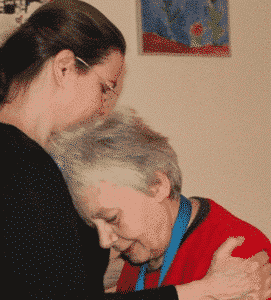Prevention of challenging behavior
Often people talk about “challenging behavior of dementia”. It can give the impression that it is only because of the dementia that the person is reacting – that it is a characteristic of the individual. Persons react in relation to the resources they have, the conditions they are subject to and the way other people meet them. From the persons perspective, the reaction is rational. All people react inadequate if they constantly are faced with demands they cannot meet. One can look at challenging behavior as a symptom of powerlessness. When caregivers experience a behavior as challenging, they tend to see behavioral problems as if the person with the behavior is the problem. In reality, caregivers get into trouble because they do not know how to handle the behavior. They must look behind the behavior.
The resources the citizen has, seems to relate to the type of the individual’s dementia, as well as the person’s history and current life situation. However, they share some common features that caregivers can take into consideration. Persons with dementia have a progressive brain injury and usually this means that nothing is self-evident and everything takes more energy than before they got ill and some needs more sleep. The cognitive capacity reduces to varying degrees. This, figuratively speaking, means that the caregiver is driving a Ferrari cognitively speaking and the person with dementia is riding in a horse-drawn carriage. The caregiver must therefore slow down the pace, both in speech and in action so that the person with dementia does not feel “run over”. (Case 1)
Another useful consideration when working with people whose behavior is challenging is always to prioritize the relationship before the task. Many people with dementia remember poorly and if they cannot recognize the person or the way the caring is performed, it is no wonder that he/she will not find himself/herself in, getting dressed or being washed. If the relationship is not good, the person will perceive it as a violation of his / her intimal zone and react in relation to this. If we are to follow the person-centered approach, we cannot regard the person as a task to be accomplished. There is a need for the person to have a good relationship with the nursing staff, who later may be given the opportunity to help him / her. Creating relationships takes time and can be a lengthy process when it comes to prioritizing a pure “task solution”
 People with dementia are constantly experiencing loss in their lives, such as loss of function, loss of cognitive skills, process skills, communication skills and a massive role loss as they can no longer fulfill the roles they have previously held. All these losses can leave the persons with a tremendous sense of powerlessness and the person will react accordingly. Powerlessness is a devastating feeling for a person, whether they are caregivers, nursing home residents or the elderly with support in their own homes. Powerless care givers are often demanding and confrontational. The caregiver then seeks to try to educate and teach the person with dementia to “behave properly”. This is rarely successful because education bases on learning and dementia just means that the person is not so good at learning anymore. It can create a conflict because the person with dementia feels that the caregiver talks to him
People with dementia are constantly experiencing loss in their lives, such as loss of function, loss of cognitive skills, process skills, communication skills and a massive role loss as they can no longer fulfill the roles they have previously held. All these losses can leave the persons with a tremendous sense of powerlessness and the person will react accordingly. Powerlessness is a devastating feeling for a person, whether they are caregivers, nursing home residents or the elderly with support in their own homes. Powerless care givers are often demanding and confrontational. The caregiver then seeks to try to educate and teach the person with dementia to “behave properly”. This is rarely successful because education bases on learning and dementia just means that the person is not so good at learning anymore. It can create a conflict because the person with dementia feels that the caregiver talks to him
like a child. He /she has behaved properly throughout his life and he / she is an adult. The person probably cannot remember what the conflict is about, but the feeling of being treated unfairly is still left in the body. For persons with dementia feelings can be seated in the body for a long time without them being able to explain specifically ´why´
